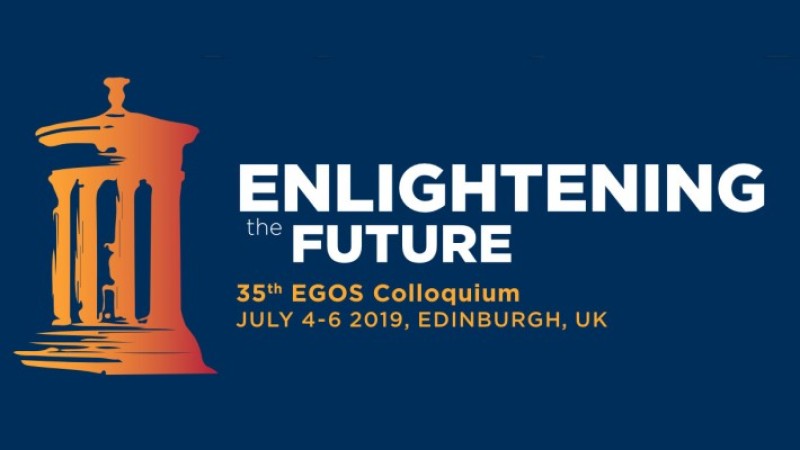Pre-Colloquium Post-Doctoral and Early Career Scholars Workshop 2019
Call for Applications
The progress of research in organizational studies relies upon the commitment and the creativity of advanced PhD students,
post-doctoral fellows and junior scholars who explore new questions, new methods and new phenomena. EGOS puts special emphasis
on supporting the academic development of younger scholars and their positioning and integration in the academic community(ies).
The purpose of this workshop is to help junior scholars to publish and to refine their paper, to facilitate their academic
socialization. We emphasize the importance of open debate and offer support in improving junior scholars’ publication capabilities
and provide an arena for explorations of issues on the cutting edge of research in multiple areas.
The workshop
is an active exchange, based on a dialogue among junior and senior academics that seeks to strengthen junior scholars' involvement
with the EGOS community and to help them in finding their ways in academia.
Content and Objectives
In 2019, the pre-Colloquium Post-Doctoral and Early Career Scholars Workshop will focus on presentations, discussions and small-group workshops, dedicated to:
Developing a better understanding of the changing publication game with inputs from current and former editors and senior faculty covering a diverse ground of methods, fields, geographies and personal experiences
Suggesting ways to improve your reviewing skills
Exploring ways to improve a paper you are working on with a view to submitting it to a high quality peer-reviewed academic journal
Submitting for Publication and the Editorial Process
Ongoing and past editors of reputable international journals will share insights and practices on the art and
craft of writing a scholarly publication. The sessions will include presentations, discussions and tutored group work, focusing
on the participants’ draft proposals for academic journal submissions. The topics covered will include: the academic journal
article as a specific genre of scholarly publication; how to identify and develop scholarly arguments; how to choose the appropriate
audience and journal when developing a specific topic; how to overcome typical problems when writing an academic paper; the
roles of editors, referees and authors in the publishing process; discussions of experiences with publishing; and how to review
other colleagues’ manuscripts in constructive ways. Many of these activities will take the form of facilitated discussions
within small groups.
The Reviewing Process
Understanding and appreciating the review process helps
scholars both as authors and as potential reviewers. You will be asked to review a paper and reflect on your experience as
a reviewer in discussion with experienced editors and reviewers. Each participant will share their review and suggestions
for improvements with the authors of the paper in small-group workshops.
Application Guidelines
To
be considered for participation in the pre-Colloquium Post-Doctoral and Early Career Scholars Workshop, participants should
have completed their doctoral dissertation within the last five years.
Please apply for admission to the workshop by
Monday, January 14, 2019 at the latest and upload (via the EGOS website) a single PDF file that contains the following
information:
A short “Letter of Application”, containing name, affiliation, postal & e-mail address, plus a statement of how the applicant wishes to benefit from attending the workshop.
A curriulum vitae.
A detailed abstract (4–10 pages). Your paper will be discussed during the workshop. We encourage you not to submit the same paper as the one you will present in one of the sub-themes of the main Colloquium. Do not hesitate to explore new ideas, perspectives or framings in your paper.
Please note!
Participants in the workshop will be selected based on the potential contributions of their paper and its fit with the faculty’s ability to discuss it and to provide useful suggestions.
Applicants will be notified of acceptance by March 1, 2019. Given the interactive nature of the workshop, the number of participants will be limited to 20–25, so it’s advisable to register as early as possible. – Please keep in mind that registration for the workshop must be submitted separately from your registration for the main EGOS Colloquium.
Upon acceptance to the workshop, participants will be given the opportunity to revise and finalize their paper up to June 1, 2019 (fixed deadline) and upload it via the EGOS website.
Between June 1 and the workshop (July 1 & 2), each participant will be asked to review at least one paper by another participant.
We expect your full commitment once your application has been accepted and you have agreed to participate: a late cancellation effectively blocks an opportunity for one of your colleagues.
Participants are strongly encouraged
to apply for other pre-Colloquium workshops offered on Wednesday, July 3, 2019, as well as to consider the submission of a
short paper to one of the sub-themes of the main EGOS Colloquium. All details are available on the EGOS website.


